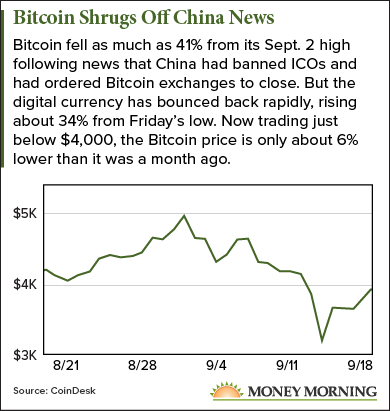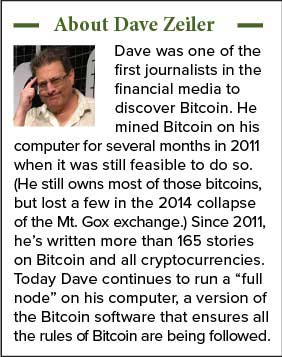The mainstream media still gets befuddled by a Bitcoin price crash, despite having covered the topic for more than four years.
September's Bitcoin crash was yet another failed chance to get it right.
After hitting an all-time high of $5,013.91 on Sept. 2, the Bitcoin price fell as much as 41%, bottoming out Friday at $2,951.15.

News out of China and some particularly disparaging comments from JPMorgan Chase & Co. (NYSE: JPM) CEO Jamie Dimon have been the catalysts behind this Bitcoin price crash.
Seeking to rein in what it viewed as dangerous speculation, Chinese regulators, led by the People's Bank of China, declared initial coin offerings (ICOs) illegal on Sept. 4. Then word came on Sept. 11 that China would be shutting down all the Bitcoin exchanges operating in the country.
In the middle of all this, Dimon dumped on Bitcoin at a Sept. 12 banking industry conference.
"Bitcoin will eventually blow up. It's a fraud. It's worse than tulip bulbs and won't end well," Dimon said.
Bad news for Bitcoin to be sure, but too many media stories and commentaries interpreted these events in a way that suggested Bitcoin's very existence was threatened.
These are but a few examples of what's been going on...
How the Media Misread the Bitcoin Price Crash
On the CNBC website, veteran analyst Ron Insana published an article with the headline, "Bitcoin Is in a Bubble, and Here's How It's Going to Crash."
Citing Dimon's comments, Insana agrees that Bitcoin is a bubble that will "end badly," akin to the Dutch "Tulip Mania" of the 1630s. I debunked this myth two years ago, but every drop in the price of Bitcoin revives the faulty Tulip Mania comparisons.
Think about it. How many popped bubbles reinflate time and time again? And then move to a new all-time high?
The Bitcoin "bubble" has burst four times this year alone - and several times before that (2014 being the most dramatic episode).
By the way, after bottoming out just below $3,000 early Friday, the price of Bitcoin rebounded nearly $800 - 27% - in less than five hours.
If Bitcoin is a bubble, we need to redefine the term.
Life-Changing Profits: This investing strategy has racked up 34 triple-digit wins so far this year - and 50 in the last 12 months. To learn how to get in position for the next one, click here now...
Let's move on to Forbes, which ran two pieces based on the events in China.
A commentary by Jason Bloomberg titled "Collateral Damage from the Inevitable Bitcoin Crash" also makes a lot of false assumptions.
It's based on the idea that China's actions were "the first few dominos to fall, heralding a complete collapse of the Bitcoin speculative bubble."
So certain is Bloomberg of this premise that he declines to explain why this collapse is inevitable, declaring instead: "That fact is too obvious to warrant such an argument." (He spends the rest of the piece detailing the ramifications of a Bitcoin collapse.)
Another Forbes commentary by Panos Mourdoukoutas, "Why China Crushed Bitcoin," claims that China's crackdown "questions the very legitimacy of Bitcoin, and its prospects for gaining broad acceptance as medium of exchange, an asset, and a means of different payments."
Mourdoukoutas adds, "the buzz for the digital currencies is gone."
Then there's MarketWatch...
A Pattern of Hostility Toward Cryptocurrencies Exposed
MarketWatch has been especially hostile to Bitcoin lately. Brett Arends wrote a piece on Sept. 7 titled "Bitcoin, Ether and Other Cryptocurrencies May Be Seeing the Beginning of the End."
Arends sees the events in China as a preview of a global government crackdown on cryptocurrencies like Bitcoin, rendering them "unconvertible into anything useful."
He's certain governments will severely restrict or ban cryptocurrencies sooner or later. While it is certain governments will want to regulate cryptocurrencies, they also recognize their vast economic potential.
Related: What's the Best Cryptocurrency to Invest in Today?
A week later, MarketWatch ran a story with the headline, "Dimon Calls Bitcoin 'a Fraud' and May Have Delivered the Biggest Blow to the Digital Currency."
 This one is notable for making the ridiculous claim that Dimon's comments were "the biggest blow" to Bitcoin. Not the Mt. Gox debacle in 2014? Not Warren Buffett's remarks that same year to "stay away" from Bitcoin because it's a "mirage"? Not any of the hacks of Bitcoin exchanges? Not even the recent news from China?
This one is notable for making the ridiculous claim that Dimon's comments were "the biggest blow" to Bitcoin. Not the Mt. Gox debacle in 2014? Not Warren Buffett's remarks that same year to "stay away" from Bitcoin because it's a "mirage"? Not any of the hacks of Bitcoin exchanges? Not even the recent news from China?
The best part of all this is that the so-called "Bitcoin price crash" didn't even last two weeks. The price of Bitcoin began to reverse Friday, climbing 34% to just over $4,000 yesterday (Monday).
If the mainstream media had bothered to research Bitcoin's history, they'd have expected this. It's why Bitcoin veterans don't get rattled during these events.
But the media also failed to explain what was really going on in China and why it never posed a serious threat to Bitcoin.
Let me clarify...
Why China Has No Intention of Killing Bitcoin
[mmpazkzone name="in-story" network="9794" site="307044" id="137008" type="4"]
Notably absent from the mainstream media is the vital fact that China does not come close to dominating global Bitcoin trading.
Figures vary depending on which website you use, but China makes up no more than 20% and perhaps as little as 6% of worldwide Bitcoin trading.
Instead, many stories mention that China's exchanges accounted for 90% or more of Bitcoin trading at the start of the year. But they neglect to explain that the bulk of those trades were fake, fueled by zero fees. When the PBOC ordered the Chinese exchanges to charge fees, volume plummeted.
The elimination of China from the Bitcoin market will have an impact, but increasing volume from places like South Korea and Japan has already started to compensate.
The mainstream media also failed to dig into the long-term fate of Bitcoin in China. The closing of the Bitcoin exchanges and the banning of ICOs is unlikely to be permanent.
 Instead, it's likely that the large amounts of money ICOs were raising, and the rapid appreciation in the price of Bitcoin and other cryptocurrencies, made Chinese regulators very nervous. China doesn't like what it cannot control.
Instead, it's likely that the large amounts of money ICOs were raising, and the rapid appreciation in the price of Bitcoin and other cryptocurrencies, made Chinese regulators very nervous. China doesn't like what it cannot control.
I believe both ICOs and cryptocurrencies eventually will return to China, but under very restrictive rules about who's allowed to trade. And ICOs will be on a short leash.
Ultimately, China's relationship with cryptocurrencies will look a lot like its relationship with the Internet. Outside elements will be mostly walled off, while domestic projects encouraged.
So you have the Great Firewall of China blocking most of the outside Internet, while domestic Internet-based companies like Alibaba Group Holding Ltd. (NYSE: BABA), Weibo Corp. (Nasdaq: WB), and JD.com Inc. (Nasdaq: JD) get China's official blessing.
That's why I believe Neo, also known as "China's Ethereum," will someday become the most important cryptocurrency platform in China.
Bitcoin investors still need to keep an eye on China because even the limited return of Bitcoin trading will be seen as a positive by a market that had assumed it was gone for good.
And don't forget, as these writers did, that the majority of the near-term catalysts for the Bitcoin price remain unaffected by whatever happens in China.
In particular, the arrival of a Bitcoin ETF before the end of the year - most likely the Winklevoss Bitcoin Trust (BATS: COIN) - would draw massive amounts of fresh money into Bitcoin, driving the Bitcoin price well past its all-time high.
Up Next: The Gains Keep Coming
Money Morning Chief Investment Strategist Keith Fitz-Gerald has a strategy for his High-Velocity Profits subscribers that sets them up for twice the profit potential of the "average" investor.
Subscribers who have been following along with his recommendations are racking up wins at a dizzying pace.
Nine gains in one week alone... 34 triple-digit gains this year... 50 triple-digit wins in the last 12 months...
Profits like that can be life-changing. Learn all about High-Velocity Profits here - and get in position for the next winner now.
Follow me on Twitter @DavidGZeiler and Money Morning on Twitter @moneymorning, Facebook, or LinkedIn.
About the Author
David Zeiler, Associate Editor for Money Morning at Money Map Press, has been a journalist for more than 35 years, including 18 spent at The Baltimore Sun. He has worked as a writer, editor, and page designer at different times in his career. He's interviewed a number of well-known personalities - ranging from punk rock icon Joey Ramone to Apple Inc. co-founder Steve Wozniak.
Over the course of his journalistic career, Dave has covered many diverse subjects. Since arriving at Money Morning in 2011, he has focused primarily on technology. He's an expert on both Apple and cryptocurrencies. He started writing about Apple for The Sun in the mid-1990s, and had an Apple blog on The Sun's web site from 2007-2009. Dave's been writing about Bitcoin since 2011 - long before most people had even heard of it. He even mined it for a short time.
Dave has a BA in English and Mass Communications from Loyola University Maryland.



